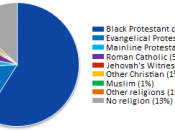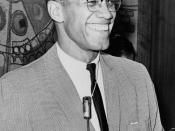Religion played a very crucial and significant role in the United States especially
after the American Revolution. It offered a ethical consent to for opposition to the British
and gave the average American proof that the revolution was justified in the eyes of God.
The Revolutionary war split numerous denominations, especially that of The Church of
England. Their ministers were sworn by oath to support the King, and the Quakers, who
were traditionally pacifists. The practices of certain religouns suffered greatly because of
the absences of ministers and the destruction of churches, but in other aspects of the
church, religion flourished.
The grand religious revivals that took place during the 1800's that ultimately
gathered all ends of the country began at opposite ends of the land. They were the Second
Great Awakening in New England and the Great Revival in Kentucky. The major
religious improvement produced by the Kentucky Revivals was the camp meeting.
These
revivals were organized by Presbyterian ministers, who regularly used emotional,
demonstrative displays of religious passion. In Kentucky the pioneers moved their
families and supplies into wagons and went to the Presbyterian meetings, where they set
up their tents and settled for about several days. They assembled in a field in the forest
and had long meetings regarding their faith. The people who went to these meetings
transformed the site into a camp meeting. These revivals that swept the Kentucky camp
meetings were so passionate and emotional that the church membership doubled in the
18000's.
Self discipline hit the merchant class the hardest because of their pursuance in
occupational ambitions that were connected with their job-related ambitions connected
with the quest of spiritual freedom. Charles Finney was a lawyer who turned minister. He
noticed the less commendable aspects of inner-city growth. They included heavy
drinking, prostitution, and gambling. He instituted a six month revival that was directly
aimed towards business men and women. He converted numerous amounts of people
using his persuasion. His use of metaphors also helped and converted thousands of
people. Minorities were greatly affected by this revival. In essence, the democratization
of Christianity was starting up. The ratio of women who were in church outnumbered
men two to one and more women preachers were beginning to appear. African-
Americans were also folowwing the trend and many rapidly converted to Christianity and
started giving sermons. This eventually led both African Americans and women to start
their own societies and hold conventions.
Although women were not allowed to be ministers, they found other ways to put
their religious views into practice. They started their own religious societies that dealt
with the different issues that concerned them. Many of the issues included slavery,
suffrages, and sex. The first women's right's movement was held at Seneca falls in 1848.
They came to the convention with their own statements that stated the ways in which
women have been discriminated against and said that as citizen's women should have the
same God given rights that were stated in the Constitution.
Generous societies were brand new and were also noticeable to the American
landscape in the first- half of the 19th century. Moral Reformers who were once, devoted
to the salvation of souls, were the result of the above par commitment that was generated
by the Evangelical movement. The New York Female Morality Reform society stated
that all men that lacked self-control were threats to society. They said that they were the
reasons for prostitution and sexual sins. These female reformers published The advocate
of Moral Reform. This was the first national circulating women's magazine that was
edited, written, and typed, all by women. It pushed the limits of what women could say
and do. This also spawned the first feministic movement for women rights. Many women
were became even more inclined to unite in anti-slavery societies. They did this because
they felt as if they were receiving the same amount of discrimination as that of African
Americans.
Many Abolitionists began to attract national in the 1840's and 50's. The continual
expansion of the western frontier allowed the controversial idea to link to a goal that
white Northerners couldn't ignore. The north and South had numerous battles of
sectionalism of states and which could attain more land. As a result when this struggle
was going on, more Northerners started supporting the Abolitionists and the idea of snit-
slavery.
While African American Christianity began to emerge in the 18th century, there
was little argument that it's basis was grounded in evangelicalism. Baptist and
Methodists converted large numbers of African Americans during the Second Great
Awakening. The unfair treatment that African Americans received from their colleagues
discouraged them. Their was also huge setback to abolish slavery that many white
Baptists and Methodists had supported after the Revolution . African American leaders
formed their own denominations because of their unhappiness couldn't be contained.
Slave owners were given instructions to convert both slave and Native Americans
to Christianity during the 1680's. However, some slave owners didn't care less about the
spirituality of their slaves and allowed them to continue their native African religions. It
wasn't until the 18th century the Methodists and Baptists attempted to convert African
Americans tried to give a logical explanation of their enslavement. The reason
that planters began promoting slavery was that it thought slaves obedience and gave them
a sense of salvation. They preached that this was a way to teach submission to their
slaves while in fact the slaves were developing their own Christian religion. The bible
gave slaves the hope of that someday they would be freed, just like Moses and his people.
They instilled values with the incorporation of African influences with dance and song,
unlike the traditional white Christians. African Americans began developing their own
sense of identity with in America. In 1845 John L. O'Sullivan created the Term,
"Manifest Destiny". This idea stated that it was that it was America's fate and right to
expand westward. The plan of expansionism and conquest greatly contributed and
awakened many leaders, southerners, and even northerners. It also gave the mindset that
these new territories would bring opportunity and freedom to African Americans. This
also brought back the spirit that had brought the Puritans to America and the goals they
wished to accomplish. The push to keep liberty, democracy, and prosperity greatly
influenced the expansion.
The United States was definitely influenced and centered by religion from the
very beginning. Even tough all these cultures and ideas may no longer exist, most
religions in the U.S. were created from others. Ultimately every religion in the U.S. is
linked because of the revivals that took place during the 1800's. America in itself, is a
parallel to this idea because it originated from different cultures. You can find a piece of
Spain, Britain, and French culture in America's society today.


